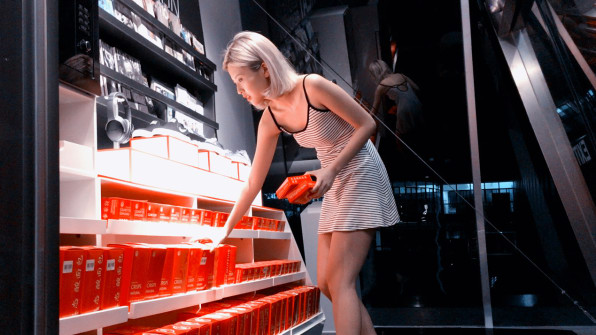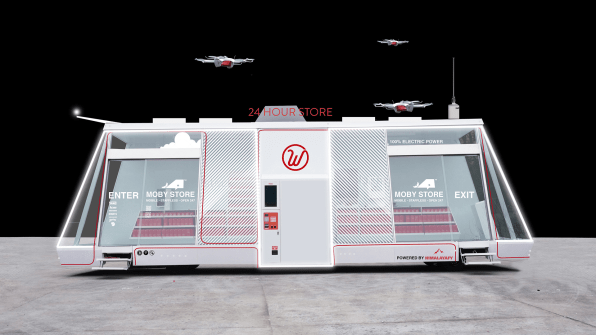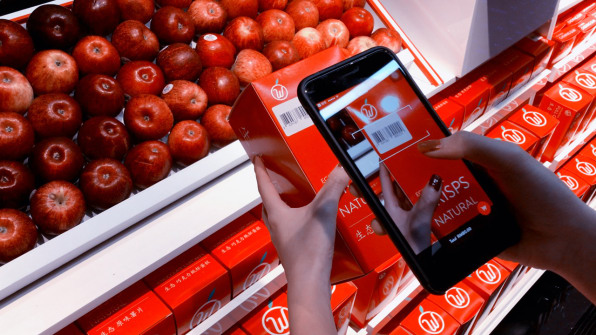“We’re convinced that this, or a similar system, is the future of retail.”[Photo: courtesy Wheelys]
Can the Moby store bring locally controlled convenience stores to places that lack a simple place to buy essentials?
In Shanghai, a prototype of a new 24-hour convenience store has no staff, no registers, and the whole thing is on wheels, designed to eventually drive itself to a warehouse to restock, or to a customer to make a delivery.
The startup behind it believes that it’s the model for the grocery store of the future–and because it’s both mobile and far cheaper to build and operate than a typical store, it could also help bring better access to groceries to food deserts and rural areas.

For consumers, it’s designed to be an easier way to shop. To use the store, called Moby, you download an app and use your phone to open the door. A hologram-like AI greets you, and, as you shop, you scan what you want to buy or place it in a smart basket that tracks your purchases. Then you walk out the door; instead of waiting in line, the store automatically charges your card when you leave (Amazon is testing a similar system). The tiny shop will stock fresh food and other daily supplies, and if you want something else you can order it using the store’s artificial intelligence. The packages will be waiting when you return to shop the next time. When autonomous vehicles are allowed on roads, the store could also show up at your home, and the company is also testing a set of drones to make small deliveries.
In a dense urban neighborhood with high rents, the low-cost system could make it possible for a group of neighbors to launch their own local grocery. “The biggest costs to have a store are the place itself to rent in a central city–it’s ultra-expensive–and then staff is really expensive, and we’re removing both of these at the same time,” says Tomas Mazetti, one of the founders of Wheelys, the Sweden-based startup that is developing the store along with China’s Hefei University and Himalayafy, an offshoot of Wheelys focused on the technology inside the store.
Wheelys already makes small mobile coffee carts designed to help young entrepreneurs compete with chains like Starbucks when they don’t have the funds to rent space for a standard cafe. It envisions that its new mobile markets could similarly be purchased and used by almost anyone, anywhere. The company also plans to mass-produce the stores, making them cheaper to build than traditional local construction (the company expects that it may be possible to build a store for $30,000; on top of any markup, store franchisees would also pay a small “community fee” to get support from the company on logistics). Solar panels on top of the store are designed to power the vehicle’s electric motor and all of the equipment and lighting inside.

For the startup, the new product seemed like a logical step. Cafe customers were already beginning to ask for larger stores. “Apart from the size, the basic construction is not that much more complex than our biggest mobile cafes,” says Mazetti. “The university provides us with access and a technical edge in some areas such as self-driving tech.” In 2016, the company acquired Näraffär, a Swedish startup with technology for a staff-less store, and a staff-less (but not mobile) store operated in Sweden until the company began the project in Shanghai.
In rural areas and small towns, the design could replace main street stores that have disappeared. “I grew up in the countryside in Northern Sweden,” he says. “The last store closed there in the 1980s sometime, and after that, everyone just commuted into the city, but that takes an hour. A little piece of the village died. Now, suddenly, in a place like that, the village can team up and buy one of these stores. If the village is really small, [the store] can move around to different villages.”

The system is also designed to restock itself automatically. In a city, one Moby could self-drive to a warehouse to replenish itself while another takes its place (the current model can be controlled remotely or driven by a human; the designers are still finalizing the autonomous technology, and it’s not yet legal for it to drive itself on Chinese roads). Stores could also help replenish each other, avoiding longer trips. “It’s common in stores that one store has run out of milk, another has run out of eggs, but both of them need to have a truck go back and forth to a warehouse,” he says. “We can ship these products in between, so we don’t need to go back and forth these long distances to rural areas to do this.”While the store has a limited selection, focused on day-to-day needs, the designers think that it represents what’s coming in retail. “I think 7-11 is the store of the future, combined with online retail,” says Mazetti. “There’s no point in the things in between. Because if you need a printer, or a spare part for your vacuum cleaner, or even a turkey, it makes more sense to have that delivered.”
In the beta tests, the company will continue to test the app and staff-less tech in the store, along with online ordering, how consumers merge in-person shopping with digital orders, and other aspects of the shopping experience, such as the fact that only three or four people can fit inside the tiny store at once. It will also test the store’s ability to restock itself (it will be driven to a nearby warehouse; in the future, it will be able to drive itself farther away). The company plans to quickly add more features. “Of course there are many actors on the market with deeper pockets than us, but deep pockets can weigh you down,” says Mazetti says. “We are nimble and fast and have been able to stay ahead in this field for a year. Regardless, someone needs to lead the way, and we’re convinced that this, or a similar system, is the future of retail.”After the beta tests in Shanghai–a city chosen because it’s a world leader in mobile payments, because Wheelys has an assembly plant ready there, and for its Bladerunner-like futurism–the company will continue to tweak the design. “It feels like we’re building the first car in the world and that it still looks a little like a horse cart,” he says. “I think we need to calibrate stuff, and get some things right, like how many people can be in a store at the same time. And what exactly we should sell–we don’t know that yet. We need to test it more.”
By 2018, Wheelys expects to be ready to produce and sell the stores, and help franchisees compete with other coming retail outlets like Amazon’s new brick-and-mortar stores. “I want these to be bought by families or groups of people, so that it’s not one person that owns every store in the world,” says Mazetti. “Instead of working at a warehouse for Amazon, you can own your own little store.”

